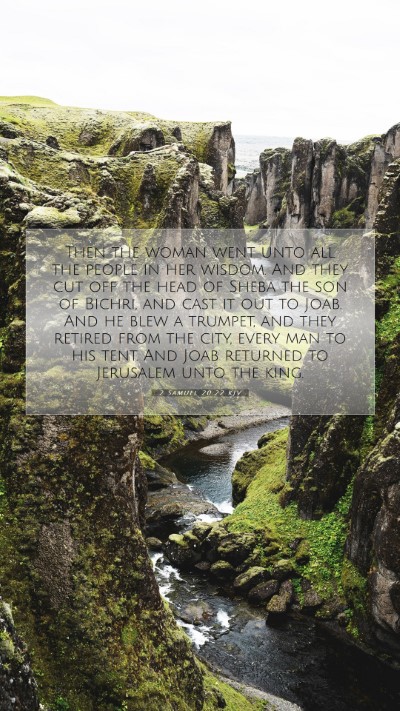Bible Verse Interpretation: 2 Samuel 20:22
Verse: 2 Samuel 20:22 - "And the woman went unto all the people in her wisdom. And they cut off the head of Sheba the son of Bichri, and cast it out to Joab. And he blew a trumpet, and they retired from the city, every man to his tent. And Joab returned to Jerusalem unto the king."
This verse reveals critical themes in the narrative of David's reign and the consequences of rebellion, leadership, and the role of women in biblical history. It unfolds a story filled with wisdom, decision-making, and the protection of a city.
Overview and Context
To comprehend the meaning of this passage, we must look at its historical context. This event occurred during the rebellion led by Sheba, who sought to undermine King David's authority. The city mentioned, Abel, is shown to be a loyal city to David, highlighting the importance of unity and judgment during times of political turmoil.
Analysis of Key Themes
- Wisdom and Leadership: The woman mentioned in this verse demonstrates remarkable wisdom, showcasing the ability to influence and lead in dire circumstances.
- Consequences of Rebellion: The swift actions taken against Sheba signify the seriousness of rebellion against God’s appointed leader, emphasizing the consequences of dissent.
- Role of Women: This passage also highlights the instrumental role that women played in biblical narratives, often being the key to resolving conflicts and making strategic decisions.
Insights from Public Domain Commentaries
Matthew Henry's Commentary: Henry emphasizes the wisdom of the woman and her decisive leadership, stating that her quick thinking and understanding of the situation led to the preservation of the city from destruction. He points out that her actions were instrumental in restoring peace and underscores the importance of communal responsibility in addressing threats to governance.
Albert Barnes' Notes: Barnes discusses the implications of the rebellion against David. He notes that Sheba's threat caused significant concern for David's kingdom, leading to the military action commanded by Joab. The commentary highlights the decisive measures taken by the citizens of Abel, demonstrating their loyalty and commitment to maintaining order and stability within their community.
Adam Clarke's Commentary: Clarke adds depth by exploring the historical significance of Abel and the inhabitants' immediate response to the crisis. His analysis outlines the factors that lead to the citizens’ willingness to act swiftly in order to protect themselves and their leader. This commentary illustrates the dynamic between authority and civil duty, as seen in this situation.
Significance and Application
The application of this verse extends beyond its historical context. It encourages individuals to reflect upon their actions and the impact they have on the wider community. The wisdom and decisive nature of the woman serve as an example of leadership - showing that wisdom should guide our decisions, especially during tumultuous times.
Moreover, understanding Scripture through this passage prompts readers to consider their role in supporting just leadership and resisting rebellion against rightful authority. It can provide insights for bible study groups, online bible study, and other bible study resources.
Cross References
- 2 Samuel 16:9 - The response of Abishai to threats against David.
- 2 Samuel 18:14 - Joab's commitment to defending David against opposing forces.
- Proverbs 11:14 - The importance of wise guidance in community decisions.
Final Thoughts
In conclusion, 2 Samuel 20:22 is a rich passage that offers profound insights into leadership, the consequences of rebellion, and the role of wisdom in conflict resolution. Its study can enhance bible study lessons and facilitate deeper understanding of scripture for those looking to apply biblical truths to their daily lives.
For those seeking bible verse explanations, this passage serves as a reminder of the power of wisdom, the significance of unity in times of crisis, and the ongoing relevance of these themes in today’s society.


